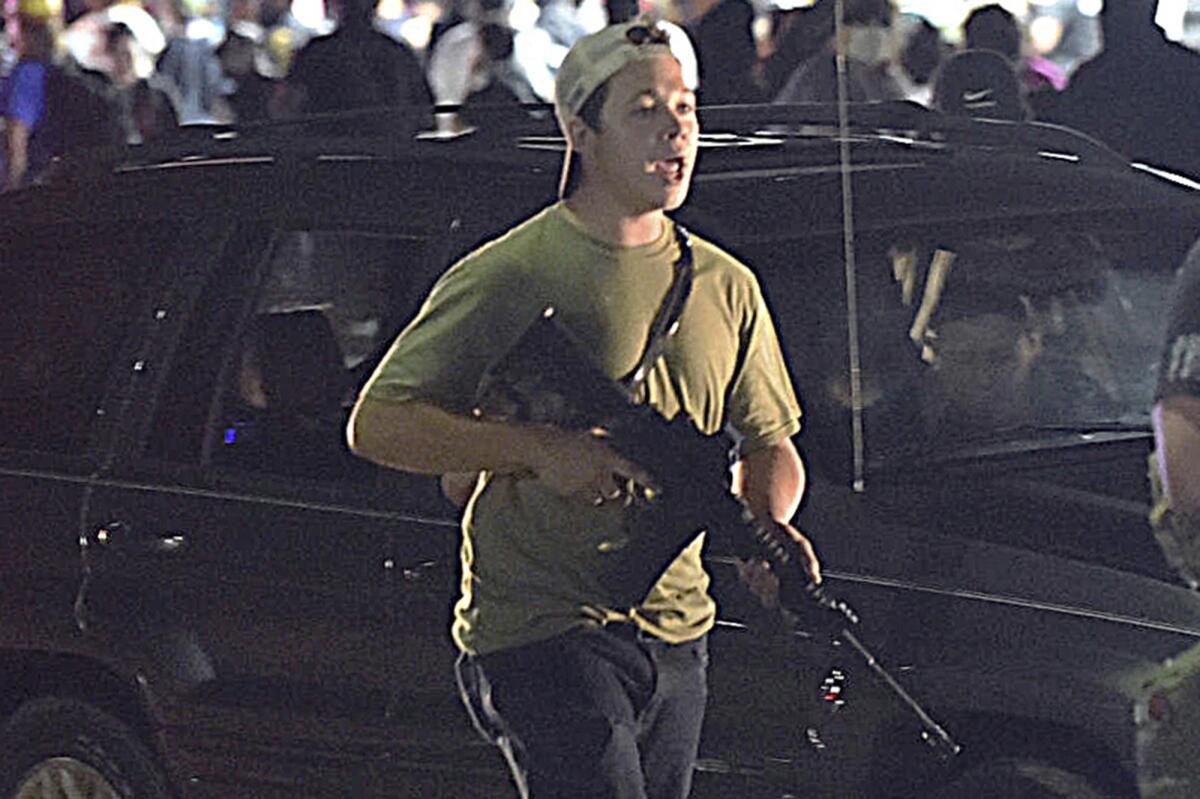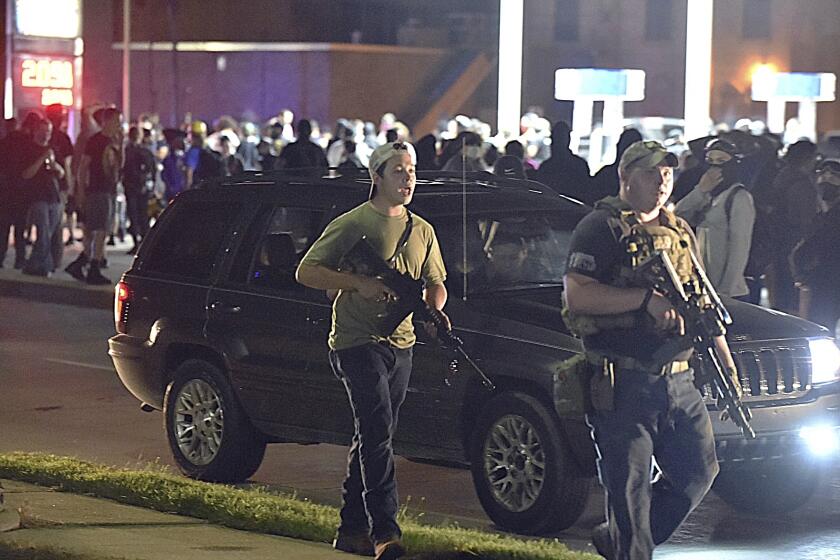States have a history of restricting guns in public. The Supreme Court should keep it that way

- Share via
This week, as a Wisconsin court begins a trial involving a protest of police abuse that turned deadly when Kyle Rittenhouse opened fired on protesters, the Supreme Court will consider whether the 2nd Amendment bars states from limiting the carrying of guns in public. The right asserted in New York State Rifle and Gun Assn. vs. Bruen is the right to bear arms, but the case’s resolution will have major repercussions for 1st Amendment rights as well.
A healthy democracy depends on robust public debate. That’s why the 1st Amendment guarantees people the right to assemble, associate and speak out, even when their messages may be upsetting or controversial. Self-government, as Justice Antonin Scalia wrote, sometimes requires people to endure “harsh criticism” and requires “civic courage, without which democracy is doomed.” But if the 2nd Amendment guaranteed everyone the right to carry guns in public, people would have to worry that the response to their speech might be not more speech but deadly force.
Many people would reasonably decide that the only safe thing to do in such situations is to keep quiet. So recognizing unrestrained 2nd Amendment rights would compromise 1st Amendment freedoms. That’s why we think states should have the discretion to limit the carrying of guns to promote the safety of the public square and facilitate the freedoms of assembly and speech exercised there. New York did precisely that, limiting the right to carry guns for self-defense to those who can show a specific need.
This is not an abstract issue. An analysis of more than 30,000 public demonstrations in the U.S. between January 2020 and June 2021 found that protests in which people are armed are more than six times as likely to erupt in violence or property destruction as unarmed demonstrations. Studies conducted by the Harvard Injury Control Research Center also show that the presence of guns can escalate arguments into incidents of intimidation and violence and that more guns in a community make people feel less safe.
An acquittal wouldn’t just set Rittenhouse free, it would set a legal precedent for other citizens to grab a gun and take the law into their own hands.
That’s one reason why authorities have long restricted the public carrying of guns; indeed, the practice dates back centuries under English law. Such laws were commonplace in this country at the time of the 2nd Amendment’s adoption, and there’s no evidence that those who wrote and ratified the 2nd Amendment meant to upend the practice.
Laws like New York’s have been adopted at various times in states as diverse as California, Wisconsin, Maine, Michigan, Virginia, Minnesota, Oregon, Pennsylvania, Texas, West Virginia, Arizona and Idaho. Even in the days of the Wild West, Dodge City, Kan., and Tombstone, Ariz., imposed strict prohibitions on the carrying of weapons in town.
Texas’ history is emblematic. In the aftermath of the Civil War, gun violence, often directed against Black people and Republicans, prompted the state Legislature in 1871 to impose a total ban on concealed carry and to permit open carry of pistols only by those with “reasonable grounds” for fearing an “immediate and pressing” attack on their person. The ban remained in place for more than a century. Texas courts repeatedly upheld its constitutionality. Texas began to grant concealed handgun licenses only in 1996.
The 2nd Amendment, in short, like most rights, is not absolute.
Those challenging New York’s law in the Supreme Court, however, argue that the 2nd Amendment presumptively requires states to issue concealed carry licenses to virtually anyone who wants one. But accepting that argument disregards our country’s longstanding tradition of regulating guns in public and does so at a time when the political atmosphere is especially combustible.
The events in Wisconsin that led to the trial of Kyle Rittenhouse on homicide charges in the shooting deaths of two protesters and the wounding of a third at a Black Lives Matter protest are not an isolated incident. Over the past few years, many political protests escalated into intimidation or violence because people were carrying guns. In Michigan, the legislative session was shut down after heavily armed anti-lockdown protesters entered the state Capitol building, prompting some lawmakers to don bulletproof vests. In Oregon, gun-toting anti-lockdown protesters fought their way into the Capitol and attacked officers with bear spray.
Some states allow widespread carrying of guns in public. That is their choice. But others, like New York, have chosen to protect the safety of the public square by limiting the presence of guns there. And that should be their choice as well. New York should not be foreclosed from seeking to foster public peace and a robust civic life by limiting concealed carry to those who demonstrate a specific need. States should be free to adopt reasonable regulations of 2nd Amendment rights in the name of promoting free speech.
David Cole is national legal director of the American Civil Liberties Union. Donna Lieberman is executive director of the New York Civil Liberties Union. The two organizations filed an amicus brief in the Supreme Court supporting New York’s law.
More to Read
A cure for the common opinion
Get thought-provoking perspectives with our weekly newsletter.
You may occasionally receive promotional content from the Los Angeles Times.










